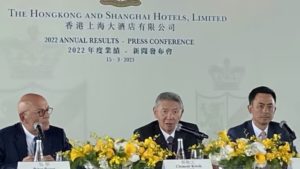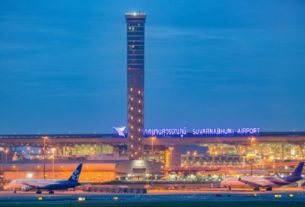
Peninsula hotel operator ready to resume stalled $130 million project in Yangon anytime
‘Suitable’ conditions sought in Myanmar after military takeover stalls work
The operator of the upscale Peninsula hotel chain is prepared to resume its stalled $130 million project in Yangon whenever conditions are deemed suitable.
Hongkong and Shanghai Hotels CEO Clement Kwok told reporters on Wednesday that the hotel construction in Yangon was suspended due to the Myanmar military’s takeover of the democratically elected government in February 2021.
But Kwok stressed that investments have been made to preserve the site “for several years, so that we could restart the reconstruction anytime, when we think [it] is suitable. The building is kept intact. I think that’s a very important point.”
The project is a joint venture with two companies controlled by Myanmar tycoon Serge Pun’s Yoma Group: Singapore-listed Yoma Strategic Holdings and Yangon-listed First Myanmar Investment. Hongkong and Shanghai Hotels owns 70%, while Yoma holds the rest.
The 88-room hotel is part of a redevelopment of the former colonial-style Myanmar Railway headquarters in the heart of the country’s former capital. The project began in 2014 and was slated to be completed last year, but construction halted in mid-2021.
Hongkong and Shanghai Hotels recorded an impairment charge of 679 million Hong Kong dollars ($86.5 million), or 85% of the project’s book value, just a year ago.

Kwok, during the company’s first in-person annual earnings press conference in four years, addressed the issue of any withdrawal from Myanmar.
“What we would prefer to see is a resumption of conditions under which we think would be suitable to complete the project,” he said.
A number of companies from Western democracies have withdrawn from Myanmar or announced intentions to do so since the military takeover and subsequent civil war. The military on Feb. 1 extended a state of emergency by six months, which provides a legal basis for the armed forces to govern without holding a general election.
Nestle recently confirmed to Nikkei it would cease operations of its plant and head office in the Yangon area. The Swiss food company joined the ranks of multinationals in withdrawing investments from Myanmar, including Norwegian telecom operator Telenor, French group TotalEnergies and Japanese beverage manufacturer Kirin Holdings.
“Clearly, as a company, we do not condone any violence whatsoever,” Kwok said, but he added that, “We generally take the view that you are helping people if you employ them.”
Yoma Strategic said Tuesday that it agreed on a debt restructuring plan with joint venture partners for another redevelopment project adjacent to the Peninsula construction.
This project, which includes four high-rise buildings for offices, shops and hotels, is also on hold. The same two Yoma companies own 60%, while 30% is held by a Japanese consortium led by Mitsubishi Corp. and Mitsubishi Estate. The rest is owned by the Asian Development Bank and the International Finance Corp., an investment arm of the World Bank.
According to a Yoma Strategic disclosure, the two lenders — ADB and IFC — agreed to grant a standstill period until June 15, 2025, in which they will take no action against any defaults.
At the same time, the Japanese consortium agreed to contribute additional shareholder loans, which would be used partly to repay and prepay the installments of the principal loan from the lenders.
This essentially provides financial breathing room for the Myanmar group. A Yoma official who requested anonymity told Nikkei that the renewed debt restructuring arrangement “will give us more time for the next two to three years.”
But a Mitsubishi Corp. spokesperson told Nikkei that the shareholders have made no decision on whether to resume the project, as they evaluate the political situation in the Southeast Asian country.
Meanwhile, Kwok said no similar new financial arrangements are being made on the Hongkong and Shanghai Hotels venture, as rent has been paid continuously to the Myanmar government, which owns the land.
Beyond the Myanmar issue, the hotel chain continued to cope with the impact of the COVID pandemic last year.
Revenue in 2022 increased by 21% to HK$4.19 billion, thanks mainly to a recovery in operations in Bangkok, Manila, Tokyo, New York and Chicago. But the company recorded a net loss of HK$488 million, worsening from HK$120 million a year ago, hit by the stringent anti-COVID policy that dragged on until the end of last year in Hong Kong and mainland China.
Additional reporting by Yuta Takagi in Tokyo.
Source: https://asia.nikkei.com/Business/Companies/Peninsula-hotel-operator-ready-to-resume-Yangon-project-anytime



